
by Alison Fraser | Mar 29, 2016 | 2016, Canada, Cultural Differences, Environment, Nature, North America
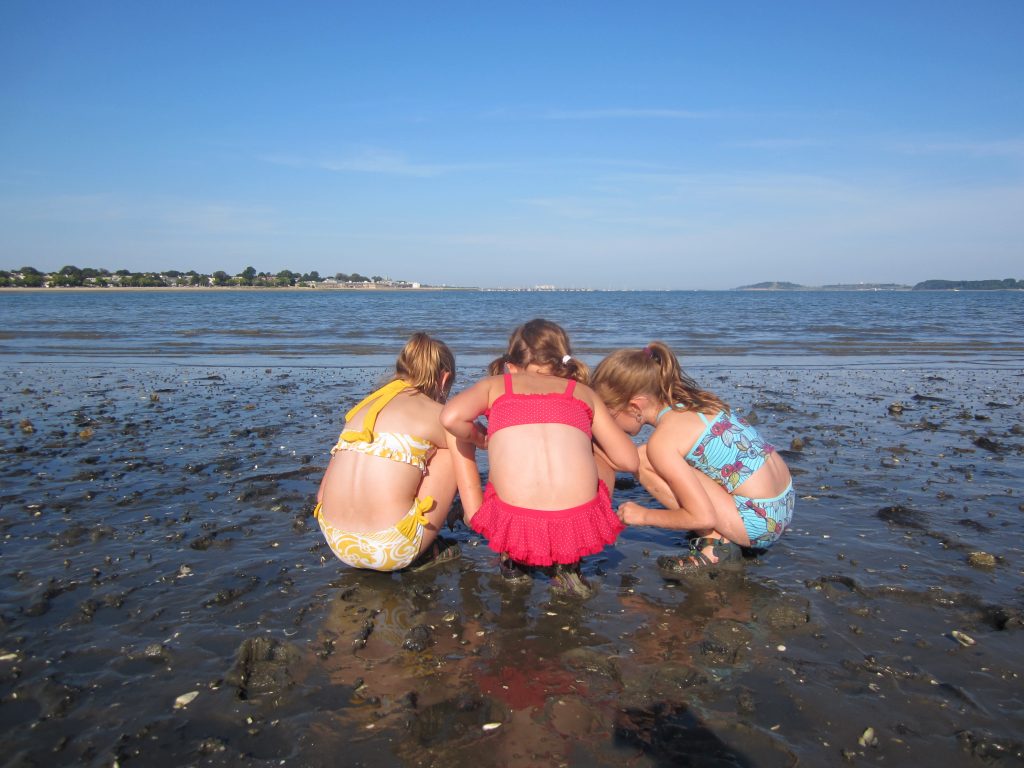 This week, as I was catching up on news headlines, a notification appeared announcing the 80th birthday of David Suzuki. David Suzuki is one of the most recognized and respected environmental scientists and activists of our time. And, he is Canadian – something I am very proud of. But when I shared this tidbit of information with my daughters, they didn’t share my enthusiasm. What I soon realized is that his name meant very little to them. How did this happen?
This week, as I was catching up on news headlines, a notification appeared announcing the 80th birthday of David Suzuki. David Suzuki is one of the most recognized and respected environmental scientists and activists of our time. And, he is Canadian – something I am very proud of. But when I shared this tidbit of information with my daughters, they didn’t share my enthusiasm. What I soon realized is that his name meant very little to them. How did this happen?
I remember being a child and thinking of David Suzuki as a homegrown hero. I would eventually study environmental science in university and graduate school, and then work as an environmental consultant. I think much of my career path was shaped by the Suzuki movement in Canada.
The very first fundraiser that I ever organized as a child was to save polar bears. Why were my daughters not feeling the same way? Sure, they love and respect nature, and spend their summer days exploring outdoors from dawn to dusk, but they were not nearly as passionate about environmental issues as I was when I was their age.
In response to this realization, I made a trip to our local bookstore and purchased a children’s book on climate change written by David Suzuki, himself. We then proceeded to hold mini-discussions within our family on various environmental issues. I have to admit, that I found it incredibly difficult. Climate change is scary. When you hear that a 2 degree Celsius change, in the global average temperature, can have devastating effects on the world in which we live, it underscores just how delicately balanced the earth really is.
Explaining this to young children is just as delicately balanced. How do you ensure they understand the severity of the issue, without making the situation terrifying and seemingly hopeless?
Through our discussions, my girls began to not only learn about the science behind climate change, but also about what they could do to limit their impact on the environment. They are becoming more and more passionate about environmental issues by the day. They now have countless ideas on how they can “help the environment”. One of their big concerns is parents idling cars in school pick-up zones. They plan on approaching their school to come up with a ban on idling, thereby reducing greenhouse gas (GHG) emissions. It may be a small step, but it is a start. And, it allows school-aged children to not only have a direct part in reducing GHG emissions but also provides an avenue in which to have further climate change discussions at home, at school and within the community. I truly think that they understand the severity of climate change now, but their passion and commitment to change the future far outweighs their fear.
This all caused me to wonder how others, around the world, address the issue of climate change with their children.
Are there any resources or approaches that you use that others would benefit from knowing about?
This is an original post by Alison Fraser who is Founder and Director of Mom2Mom Africa.
Alison Fraser is the mother of three young girls ranging in age from 5 to 9 years old. She lives with her family in Cambridge, Ontario, Canada. Alison works as an Environmental Toxicologist with a human environment consulting company and is an active member of the Society of Environmental Toxicology and Chemistry (SETAC). She is also the founder and director of the Canadian Not for Profit Organization, Mom2Mom Africa, which serves to fund the school fees of children and young women in rural Tanzania. Recently recognized and awarded a "Women of Waterloo Region" award, Alison is very involved in charitable events within her community including Christmas Toy and School Backpack Drives for the local foodbank.
More Posts - Website
Follow Me:


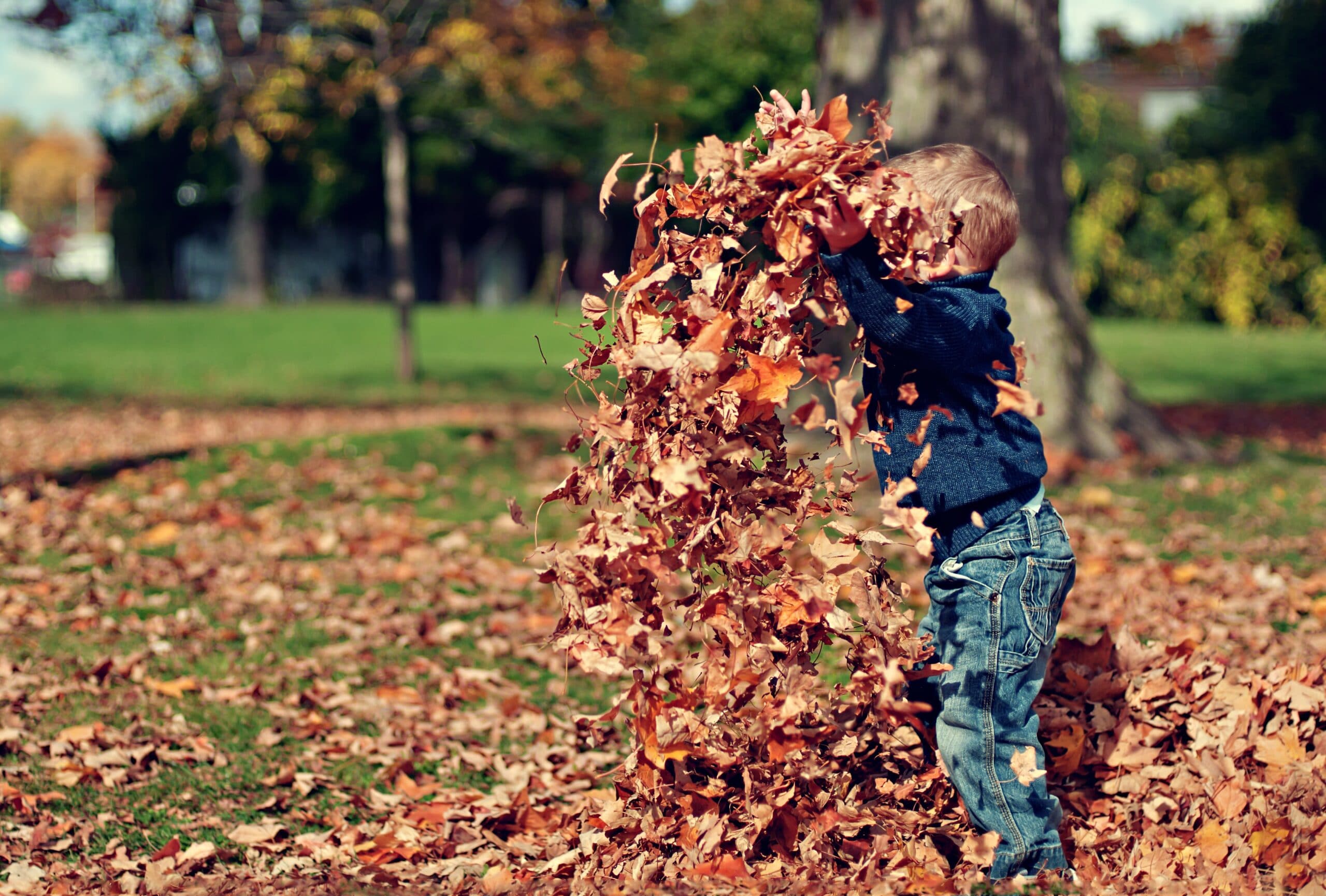
by juliegd | Mar 14, 2016 | 2016, Babies, Brazil, Cultural Differences, Culture, Europe, Parenting
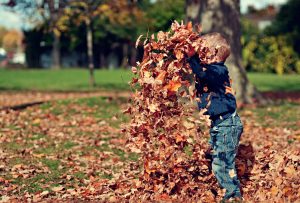 I realize that in my last post I might have sounded just slightly negative about Portugal and the Portuguese. Let me just state clearly, so there is no doubt, that I absolutely truly love living in this wonderful country. And it’s not just about the food, the sun, the wine or the beautiful beaches. Portugal is one of the most child-friendly countries I know.
I realize that in my last post I might have sounded just slightly negative about Portugal and the Portuguese. Let me just state clearly, so there is no doubt, that I absolutely truly love living in this wonderful country. And it’s not just about the food, the sun, the wine or the beautiful beaches. Portugal is one of the most child-friendly countries I know.
It is difficult for me to make a fair comparison to my home countries, since I have spent so long in Latin places (Portugal and Brazil) that my personality and culture has strayed very far from its Anglo-German origins. Just ask any English person who backs away when I enthusiastically greet them with a kiss! I’ve never tried to nurse a baby in England, never attempted to enter German restaurant with a pushchair. But it doesn’t get much better than what I’ve experienced in Brazil and Portugal.
Let’s start with pregnancy. In Brazil, you are automatically elevated to the position of demi-goddess. People in the street will exclaim how lucky and beautiful you are, no matter the size of your girth or breadth of your waddle. Little old ladies in cafés will stand in line to touch your baby belly, coo to the baby or pronounce a quick blessing. Granted, this can sometimes be a bit too much for someone who has clearly defined boundaries around their personal space (who, me?) but all-in-all being pregnant Brazil is like being wrapped in a comfy, welcoming social blanket (until you try and give birth…).
Then the baby comes.
If Mom is a demi-goddess, baby is Zeus and Hera wrapped into one. In Brazil, babies rule supreme.
Gone are the days when you could have a quiet dinner at a restaurant. Your baby may be fast asleep but every single passerby will want to lift the blanket to take a look. Random strangers will come up and offer to hold your baby, just because she’s so adorable. I’ll admit I found this difficult to adjust to: if I was uncomfortable having strangers touch my pregnant belly, I definitely did not want them carrying my newborn son around the shopping mall. But although new mothers have to learn to say “No” to little old ladies and be prepared to whip their babies out of the arms of strangers, the beauty of this attitude is that you and your baby are always welcome.
You can go to the beach, have coffee in your favorite coffee shop and even eat your favorite fancy restaurant. No waiter is too snotty to help you carry the push-chair over tables, smile at your squawking toddler and pick up his napkin the umpteenth time he drops it.
Portugal is pretty much my dream country in every single way, so I was delighted to find that this baby-friendly attitude extends across the Atlantic from Brazil.
Since moving here I have breastfed my baby in the local pastelaria, at a fancy Christmas dinner and walking along the beach. I now breastfeed a rambunctious toddler who enjoys pulling the goods out for all to see (if you know what I mean) and still, no comment, no looks, no disapproval.
If you’re out and about on your own with baby, everyone is willing to lend a hand. Just the other day two tiny old ladies offered to hold my bike while I attempted the impossible task of holding my son while switching to the other side of the handlebars. A friend of mine recently flew from France to Brazil. On the way there the Brazilian couple next to her entertained both of her kids throughout the flight. On the way back, a French couple tetchily complained when her toddler accidentally knocked against their iPad.
Like I said, I don’t really know what things are like back in England or Germany. I’ve heard positive stories of playgrounds galore, soft play centers that open on Sunday nights, and cafés with special baby corners. But I’ve also heard friends talk about feeling uncomfortable when out of the house, and of restaurants that are specifically “adult-only”. The Brazilian-Portuguese attitude that “everyone’s child is my child” of course has its downsides: I was recently berated by a couple on the beach for allowing my son to walk barefoot.
But for the moment, I’m just going to count my blessings. My attitude to parenting is that my baby just comes with me wherever I go – how lucky am I to live in a country that gives me the freedom to do exactly that.
How child-friendly is the country you live in? How do you feel about child-free restaurants?
This is an original post to World Moms Blog by Julie of Portugal. Photo credit to the author.
Julie, her husband and baby boy are currently living in Portugal, having spent the previous three years in the southeast of Brazil.
She considers herself a bit of an obsessive reader, and even more so since discovering she was pregnant. All that information has to go somewhere, which is why Julie started her blog, happy mama = happy baby, where she documents all the quirky parenting ideas she has collected so far.
More Posts - Website
Follow Me:


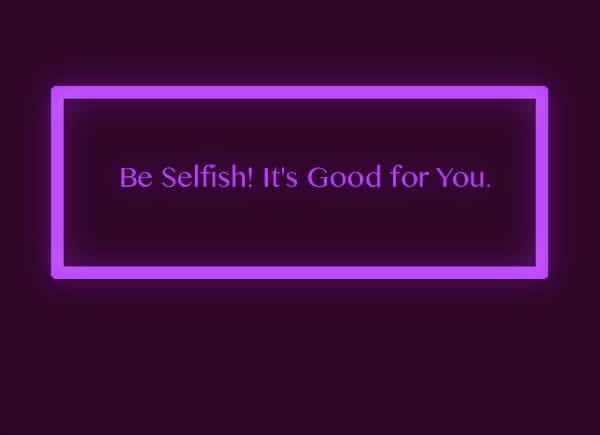
by ThinkSayBe | Jan 29, 2016 | 2016, Advice, Awareness, Being Considerate, Being Thankful, Caring, Celebrations, Child Care, Communication, Cultural Differences, Discipline, Equality, Family, Gratefulness, Happiness, Health, Helping, Husband, Identity, Independence, Kids, Life, Life Balance, Life Lesson, Maternal Health, Me-Time, Mental Health, Motherhood, North America, Parent Care, Parenting, Priorities, Relationships, Respect, Responsibility, Responsibility, Stress, ThinkSayBe, Time, Uncategorized, USA, Womanhood, World Motherhood

A life coach (LC) once told me it is important to be selfish sometimes. She had to explain what she meant because for as long as I could remember, the word ‘selfish’ was synonymous with not caring about anyone other than yourself. Well, LC was one of the sweetest people I have met, yet she did not strike me as one who would accept being pushed around, or would accept becoming a doormat. Usually, really sweet people are considered people on whom you can ‘get over’, right?
When I had this conversation with her I was already mother to by firstborn. However, I did not come to really contemplate the meaning of being selfish while being a mother, until after having my second child.
What LC was conveying to me is that although I am a mother, I am a person. Separate from all the titles I gather in life I have myself and I have to take care of self. You’ve probably heard it or read it somewhere…’If you don’t take care of yourself, you can’t take care of anyone else’. I have heard people reference it to when an aircraft loses oxygen and you are to put an oxygen mask on yourself before helping someone else, even your own child, put on her mask. Still, the word ‘selfish’ isn’t used here, even though it may be more concise and cost less to print. I do understand why: it just doesn’t sound good.
Nonetheless, being selfish (to an extent) is necessary for sanity, self-esteem, creativity, and a dynamic life.
I don’t know about other mothers, but I tend to analyze a lot. It used to be that before I left the house (children and husband in it), I would think of all I could do to make sure everything for the kids was where it was supposed to be so my husband could easily find it. It was as if the time I was going to be away had to be excused in my own mind, and that I was negatively selfish for not being there to care for them myself. I know this is absurd because we are both their parents and my husband hasn’t indicated, in any way, that he thinks or feels any of the things I am explaining here.
I realized I was hindering my own self from taking a break. From clocking out from my Stay At Home career. From taking care of me. From figuring out how to take care of me beyond taking a shower and maybe putting on some make up.
So about a month and a half ago my husband and I had a conversation. We acknowledged that we both feel the difference in our lives from how it was pre two small children and a teenager, to post two small children and a teenager. We agreed that we both need time to be ourselves individually and together. At the end of that conversation it was decided that I was going to begin taking scheduled ‘Me Time’.
The first time I had no clue what to do with myself. I was happy to leave the house and go do something. I didn’t want to waste my time. I didn’t want to do something as mundane as go window-shopping or take a nap in my car…like I have done a few times in the past. Then I realized I could do anything I wanted and I would be doing it by myself!
When I returned home I felt energized and didn’t feel like I needed to clock out again for a while. The second time I felt kind of guilty, leaving everyone again, so as it was already hard to schedule something with holiday travel, I just let that one go. Today was my third scheduled Me Time and I knew exactly what I was going to do. I was going to take my selfish self to the forest and hike! Yes, I was going to take a hike!

My hike was phenomenal. It was something I needed more than I thought. I wished for my husband and my children to be with me. I kept envisioning them there, but I knew I needed to be by myself. I needed to not worry about what they might need… if they are hungry, thirsty, or need a diaper change. Or if the 15-month old had eaten a crayon or is putting his finger in his mouth and maybe is now interested in sticking it in an electrical socket.
That’s the thing, you know? Being a Stay at Home Parent means that as long as your children are awake, you have to be aware while you’re cooking or cleaning, or doing whatever else you may need to do, Additionally, you have to be present for the myriad learning moments young humans have. I personally think that is tiring. I feel like I am wrong for feeling this way. That, as a parent, but more so as a mother, I should want to be with my children all the time and I should only get a tiny bit tired just as any human would from being awake and doing regular things.
To continue, my hike was what I needed. I focused on thinking of nothing. I took deep breaths as I walked briskly onward in the chilly air. Every time I thought to meditate I would first repeat a prayer I know, and then somehow ended up seeing Purnima Ramakrishnan’s face as if she was leading a meditation session. It was so strange and SO funny! Then I kept thinking about how I should have asked if there are wild animals to be concerned about on the trails. Black bears and cougars would have to just let me have my Me Time, you know?
After the hike I watched a R-rated movie (The Big Short) and ate a cookie.
I got home to two little babes wanting to be tickled and wanting to use me as an obstacle they had to demolish. It was a lot of fun and I knew I was better for them since I went and had some time with my own self.
Do you take time to do things on your own? Do you ever feel like you could be better for your children? When you do take time away, are there specific things you do that bring you back to center? What do you think about the word ‘selfish’?
This is an original post to World Moms Blog by Sophia. You can find her blogging at Think Say Be and on twitter @ThinkSayBeSNJ.
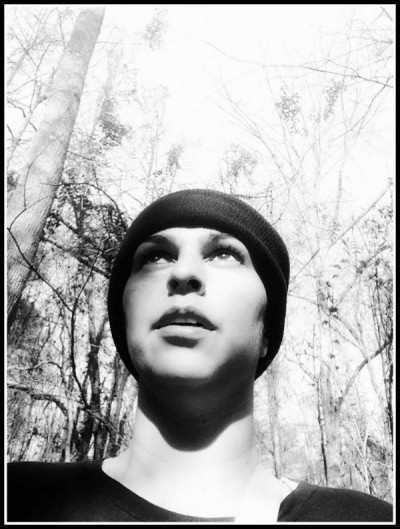
Photo credits to the author.
I am a mom amongst some other titles life has fortunately given me. I love photography & the reward of someone being really happy about a photo I took of her/him. I work, I study, I try to pay attention to life. I like writing. I don't understand many things...especially why humans treat each other & other living & inanimate things so vilely sometimes. I like to be an idealist, but when most fails, I do my best to not be a pessimist: Life itself is entirely too beautiful, amazing & inspiring to forget that it is!
More Posts
Follow Me:


by Mannahattamamma (UAE) | Dec 30, 2015 | Cultural Differences, Feminism, Gun Violence, Holiday, Living Abroad, Middle East, Older Children, Peace, Religion, Terrorism, UAE, World Motherhood
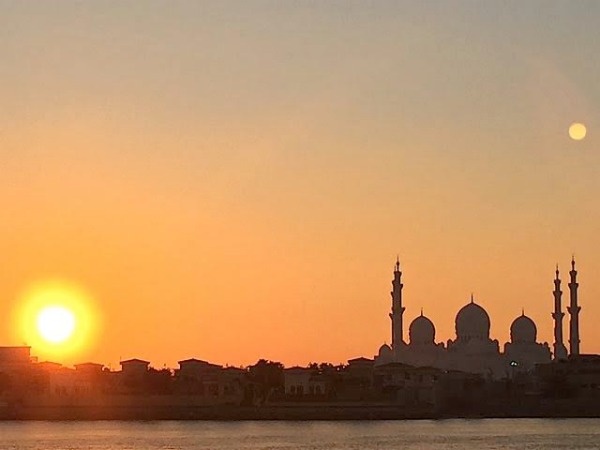
“Will we be safe there?” My 11 year old son asked me that question as we were discussing our winter holiday travel plans, and I suppose, given that we live in the UAE, his question might make sense. In the last few years, we’ve traveled to Jordan, India, Kenya – all places that have been in the news lately as sites of violence.
Where are we going for the winter holidays, you might wonder, that would elicit such a question?
The United States.
I’ll let you think about that for a minute.
Okay, true, his question was a bit of a joke – the question of travel safety has become a running gag in our household, in part because that question is always the first thing my mother (in Illinois) always asks us.
But this time, when he asked the question, none of us laughed. He’d asked us just after the last mass shooting, the one in San Bernandino. And think about that for a minute: I have to specify for you which shooting I’m talking about. Was it the one in Colorado Springs outside Planned Parenthood, or the one in Oregon, or the one…
In other countries, when you say “mass shooting,” there simply aren’t that many to choose from because in the aftermath of the tragedy, governments have changed the laws to make such events less possible. But not in the good ol’ US of A.
When I tell people in the States where I live, there are two questions I am always asked: do I have to “cover” and “do I feel safe?” The answers are “no,” and “yes.” People who didn’t worry about me strolling home after midnight in New York’s East Village in the late 1980s now seem dreadfully concerned about my safety here, in this part of the world, as I drive off to the mall.
Part of why we chose to live abroad with our children had to do with wanting to give them a cosmopolitan perspective on the world: we wanted them to experience other cultures and learn to be open to, rather than threatened by, difference. I know that in the US it is possible to live in cosmopolitan cities—we used to live in Manhattan, where children from many nations crowded into my kids’ classrooms—but it is a different experience to live in a place where “your” culture is not the dominant.
A little while back, for instance, my older son had some friends over so that we could all go to a water park in the afternoon. When I told them it was time to get ready to go, my son said “well, we have to wait a little bit because T. is in the other room doing his prayers.” T. comes from a devout Muslim family and his mother would have been pleased to know that T. didn’t miss a prayer time just because the water park called. And for my son and his other friends, T. doing his prayers was as matter-of-fact as if he’d been changing into his swimsuit, or drinking a glass of water. Ordinary.
Like many of us, at home and abroad, I wrestle with how to explain to my children why the United States can’t simply change its gun laws and why so many people in the country seem afraid of anyone who worships at a mosque rather than a church or a temple. The explanation in both instances seems to boil down to fear: fear of change, fear of difference, fear of that-which-is-not-me.
It’s not much of an explanation, but it’s the only framework I have to explain why Donald Trump, for instance, can still be considered a candidate for the Presidency.
I know that the demagogues like Trump do not speak for all the people in the United States, and that many, many people are outraged by gun violence, but alas, the picture of the country that travels outward to the rest of the world is one of violent, gun-toting Islamophobia – and it’s scary. For me the fear rests not in the thought that Trump will ever be President because I refuse to believe that his bilious self is actually electable. I hang on to that fact as ardently as I once hung on to my belief in Santa Claus. No, my fear rests in the fact that, according to a recent poll, Trump leads the group of Republican Party presidential hopefuls, with 35.8% of the vote.
THIRTY-FIVE POINT EIGHT?
Maybe there really isn’t a Santa Claus.
How do you explain what’s happening in the United States to your children?
This is an original post by World Mom, Deborah Quinn in the United Arab Emirates.
Photo Credit to the author.
After twenty-plus years in Manhattan, Deborah Quinn and her family moved to Abu Dhabi (in the United Arab Emirates), where she spends a great deal of time driving her sons back and forth to soccer practice. She writes about travel, politics, feminism, education, and the absurdities of living in a place where temperatures regularly go above 110F.
Deborah can also be found on her blog, Mannahattamamma.
More Posts
Follow Me:


by Elizabeth Atalay | Oct 6, 2015 | 2015, Cultural Differences, Culture, Education, Food, Ghana, Global Citizenship, Global Goals, Humanitarian, Kids, ONE, Social Good, Sustainable Development Goals, UN, United Nations, World Moms Blog
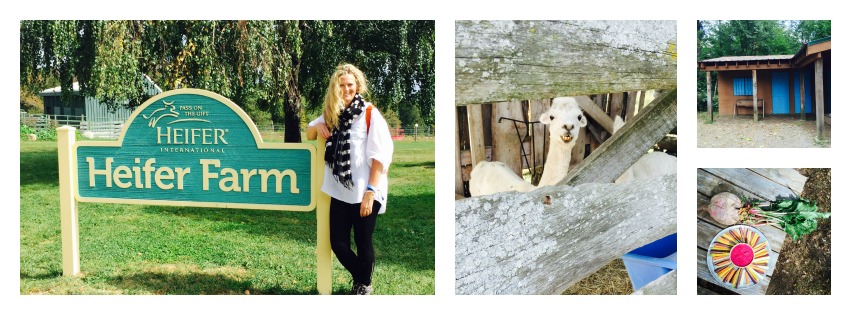
One day I was in New York City at the United Nations among World Leaders, and the next in rural Massachusetts milking a goat. Though the two may seem totally unrelated, they are actually intertwined. It will take both the efforts of world leaders and small share farm holders for the newly adopted Sustainable Development Goals to ever succeed. As a social good writer I had been to New York City for UN General Assembly week and the Social Good Summit, and then to Heifer International’s Farm located in rural Rutland, Massachusetts, where World Moms Blog had been invited to their first ever Media Day.
The new set of Global Goals are focused on sustainability which is one of the cornerstones of Heifer International’s approach. Heifer International was founded by Dan West based on his experience as a relief worker. He realized the aid work he was doing needed a new model to help those in need become self-sufficient as opposed to continually reliant on aid. As a farmer he knew that a gift of livestock was a gift that would keep on giving. A heifer refers to a pregnant cow, and in 1944 the first dairy cattle were shipped, and Heifer International born.
“Heifer International is a non-profit, humanitarian organization dedicated to ending hunger and poverty and caring for the earth. Heifer currently provides livestock, trees, seeds and training in environmentally sound agriculture to families in 30 countries, including the United States. We work with smallholder farming families and communities because we believe they are key to feeding us all.”- Heifer International
The goal of Heifer International is to help communities transform themselves through education, environmental stewardship, empowerment of women in the community, and the legacy of passing on generations of animals and knowledge. This in turn generates the accomplishment of the once recipient turning into a donor in their community.
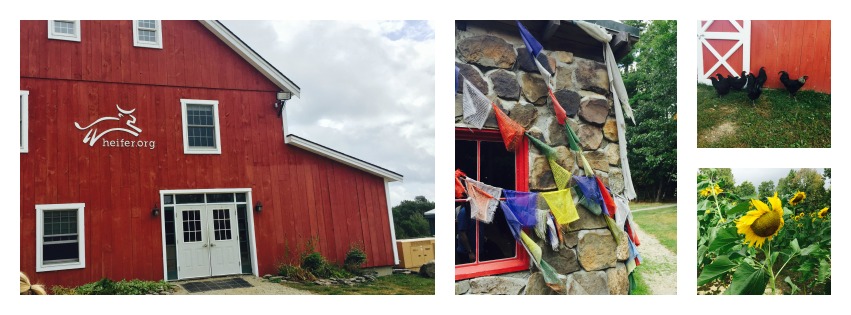
At World Moms Blog we have written about Heifer International in the past, included Heifer International in gift guides, and followed their trip last summer to Malawi with our friends at ONE Girls and Women. We had no idea however that Heifer International had a farm to showcase their programs this close to home. As it turns out, just over an hour from where I live is this hidden gem of global education!
At Heifer Farm in Rutland Massachusetts we toured the flourishing ¾ acre farm garden where we were encouraged to pull vegetables out of the ground and taste as we went along. A delicious fresh beet hummus, with a rainbow of carrot colors I had no idea they grew in, was served. Apparently the massive size of the vegetables grown at Heifer Farm has to do with the rich soil quality based on the farming techniques used, the same techniques taught to small share farmers working with Heifer International around the world. After the garden tour we had lunch in Peru.
Peru is one of the eight global villages at Heifer Farm that provide experiential, hands on learning through programs ranging from day trips to week-long camps for all ages. We then meandered through China and Ghana on our way to the barn. This brings us back to milking the goat, and to the tiny baby piglets we got to hold, and all I could think was how crazy my kids would have been for everything. I can not wait to bring them back to experience Heifer Farm! Other Heifer International sites in the US include Heifer Ranch in Perryville, and Heifer Village in Little Rock, Arkansas. If you ever have the chance to visit, I highly recommend it. If you do be sure to bring the kids, after all they are the future generation who will be seeing these new Sustainable Development Goals through to 2030. Global Goals that all stakeholders will need to be involved in, large and small.
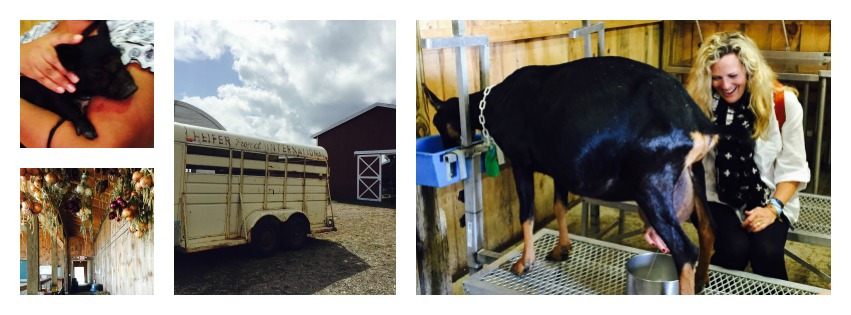
This is an original post written for World Moms Blog by Elizabeth Atalay who also writes at documama.org.

Elizabeth Atalay is a Digital Media Producer, Managing Editor at World Moms Network, and a Social Media Manager. She was a 2015 United Nations Foundation Social Good Fellow, and traveled to Ethiopia as an International Reporting Project New Media Fellow to report on newborn health in 2014. On her personal blog, Documama.org, she uses digital media as a new medium for her background as a documentarian. After having worked on Feature Films and Television series for FOX, NBC, MGM, Columbia Pictures, Warner Brothers, 20th Century Fox, and Castle Rock Pictures, she studied documentary filmmaking and anthropology earning a Masters degree in Media Studies from The New School in New York. Since becoming a Digital Media Producer she has worked on social media campaigns for non-profits such as Save The Children, WaterAid, ONE.org, UNICEF, United Nations Foundation, Edesia, World Pulse, American Heart Association, and The Gates Foundation. Her writing has also been featured on ONE.org, Johnson & Johnson’s BabyCenter.com, EnoughProject.org, GaviAlliance.org, and Worldmomsnetwork.com. Elizabeth has traveled to 70 countries around the world, most recently to Haiti with Artisan Business Network to visit artisans in partnership with Macy’s Heart of Haiti line, which provides sustainable income to Haitian artisans. Elizabeth lives in New England with her husband and four children.
More Posts

by To-Wen Tseng | Jun 12, 2015 | 2015, Awareness, Babies, Breastfeeding, China, Cultural Differences, Culture, Health, Human Rights, Motherhood, To-Wen Tseng, USA, Womanhood, Women's Rights, World Motherhood, Younger Children

I recently met with a Huffington Post columnist at Howard Plaza Hotel in Taipei. She is writing a book that tells the story of how culture has influenced the breastfeeding controversy. She asked me what is it like to breastfeed in Taiwan.
I thought carefully when answering her question. Today’s Taiwan seems to be a very breastfeeding friendly society: Taiwanese government adopted International Code of Marketing of Breast-milk Substitute in 1992 and then started to promote Baby-Friendly Hospital Initiative in 1998. Today, there are nursing rooms literary everywhere in Taiwan. From big cities to small towns, nursing rooms can be found in government buildings, in shopping malls, in libraries, in banks, in metro stations, in parks, and in restaurants. (more…)

 This week, as I was catching up on news headlines, a notification appeared announcing the 80th birthday of David Suzuki. David Suzuki is one of the most recognized and respected environmental scientists and activists of our time. And, he is Canadian – something I am very proud of. But when I shared this tidbit of information with my daughters, they didn’t share my enthusiasm. What I soon realized is that his name meant very little to them. How did this happen?
This week, as I was catching up on news headlines, a notification appeared announcing the 80th birthday of David Suzuki. David Suzuki is one of the most recognized and respected environmental scientists and activists of our time. And, he is Canadian – something I am very proud of. But when I shared this tidbit of information with my daughters, they didn’t share my enthusiasm. What I soon realized is that his name meant very little to them. How did this happen?



 I realize that
I realize that 


















